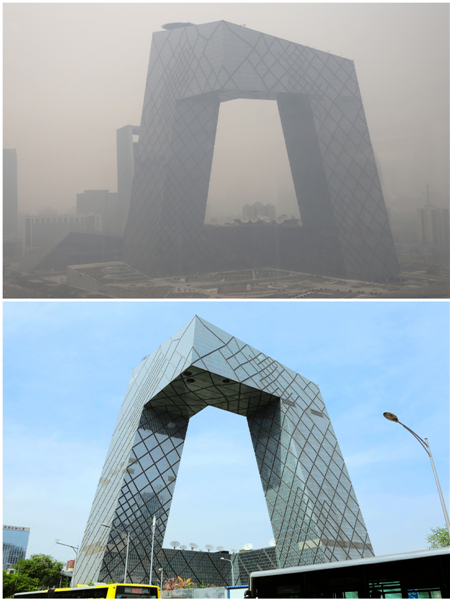China gets tough on air pollution
Updated: 2013-09-13 08:08
(China Daily)
|
|||||||||||
 |
|
China Central Television new building shrouded by smog and in clean air. Beijing has been hit hard by severe pollution since the start of the year. Li Gen / for China Daily |
Some experts expressed concerns that the measures may hamper economic growth. Wang admitted that the plan may have an adverse effect on some industries, but said it will favor many others.
"For instance, steel production capacity will be largely reduced and the industry will be able to develop in a much healthier mode," he said. "An estimated 1.7 trillion yuan ($277 billion) of investment from all channels will back up the environmental protection industry. We are sure that their combined influence on the economy will be positive."
Some experts expressed the view that a certain amount of economic fallout is natural and reasonable.
"Improving the environment is basically a form of construction, and one that definitely requires investment from society," said Zhou Dadi, vice-chairman of the China Energy Research Society.
"We have sacrificed the environment to the previous economic growth figures and the financial cost is certain to rise if we include all these factors," he said.
Another concern troubling experts and officials is the authenticity and integrity of the data involved in the plan, because they are "the basis to ensure the action plan can really make a difference to the environment", as Wang put it.
He said national-level monitoring sites run directly by the National Environmental Monitoring Center will be set up in every county-level city. There will be three sites in each municipality, two in each provincial capital and one in each of the other cities.
The construction and management of the monitoring sites is still under discussion, said Li Guogang, deputy head of the China National Environmental Monitoring Center, who stressed that the technology will not be a problem.
Li said that in addition to 74 cities that began releasing PM2.5 readings in January, a further 116 are preparing for the construction of PM2.5 monitoring sites, which will be fully operational by the end of the year.
Zhou, from the China Energy Research Society, said the accuracy of the official readings could be ascertained by comparing them with readings conducted by independent research institutes. He pointed out that it's hard to fool the public during periods of heavy pollution, a fact that should prevent the compilation and release of skewed data.
Related Stories
Immediate action to clean worsening air 2013-09-12 21:50
Beijing unveils clean air action plan 2013-09-12 18:54
China reveals multi-pronged air pollution battle plan 2013-09-12 13:51
Clean air action plan 2013-09-12 11:36
Clean air action plan to reduce pollution 2013-09-12 11:08
Clean air requires quick action 2013-09-11 10:45
Today's Top News
Rail route to Europe improves freight transport
3 sentenced to death for Xinjiang terror attack
China sets caps for rare earths exploration
Xi welcomes Iran nuclear talks
Moves against China firms criticized
China gets tough on air pollution
Developing nations need shift to balanced growth
No property bubble in sight
Hot Topics
Lunar probe , China growth forecasts, Emission rules get tougher, China seen through 'colored lens', International board,
Editor's Picks

|

|

|

|

|

|





